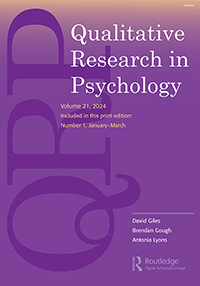Narrative and play-based interviewing - a framework for eliciting the perspectives of young children
IF 4.4
3区 心理学
Q1 PSYCHOLOGY, MULTIDISCIPLINARY
引用次数: 1
Abstract
ABSTRACT The aim of this article is to provide researchers a detailed framework for conducting high-quality research with young children 3–6 years of age. We argue that young children’s insider perspectives, perceptions and experiences are underrepresented in research owing to methodological challenges. In this article, we present a narrative and play-based approach to eliciting the perspectives of young children, 3–6 years of age, through a developmentally sensitive and child-centred approach to interviewing. We will present a practical step-by-step guide to conducting narrative and play-based interviews with young children. Throughout the article, we will provide practical examples and insights from young children. We will discuss the theory and guiding principles of child-centredness and the child’s perspective that underpin the method. Last, we will consider the advantages and limitations of the method.叙事和基于游戏的访谈——一个激发幼儿视角的框架
摘要本文的目的是为研究人员提供一个详细的框架,以便对3-6岁的幼儿进行高质量的研究 年龄。我们认为,由于方法上的挑战,幼儿的内部视角、感知和经历在研究中的代表性不足。在这篇文章中,我们提出了一种基于叙事和游戏的方法来激发3-6岁幼儿的观点 年龄,通过对发展敏感和以儿童为中心的面试方法。我们将提供一份实用的分步指南,指导对幼儿进行叙事和基于游戏的采访。在整篇文章中,我们将提供幼儿的实际例子和见解。我们将讨论以儿童为中心的理论和指导原则,以及支持该方法的儿童视角。最后,我们将考虑该方法的优点和局限性。
本文章由计算机程序翻译,如有差异,请以英文原文为准。
求助全文
约1分钟内获得全文
求助全文
来源期刊

Qualitative Research in Psychology
PSYCHOLOGY, MULTIDISCIPLINARY-
CiteScore
20.00
自引率
0.50%
发文量
14
期刊介绍:
Qualitative Research in Psychology is an international, peer-reviewed journal that publishes high-quality, original research. It aims to become the primary forum for qualitative researchers in all areas of psychology, including cognitive, social, developmental, educational, clinical, health, and forensic psychology. The journal also welcomes psychologically relevant qualitative research from other disciplines. It seeks innovative and pioneering work that advances the field of qualitative research in psychology.
The journal has published state-of-the-art debates on various research approaches, methods, and analytic techniques, such as discourse analysis, interpretative phenomenological analysis, visual analyses, and online research. It has also explored the role of qualitative research in fields like psychosocial studies and feminist psychology. Additionally, the journal has provided informative articles on ethics, transcription, interviewee recruitment, and has introduced innovative research techniques like photovoice, autoethnography, template analysis, and psychogeography.
While the predominant audience consists of psychology professionals using qualitative research methods in academic, clinical, or occupational settings, the journal has an interdisciplinary focus. It aims to raise awareness of psychology as a social science that encompasses various qualitative approaches.
In summary, Qualitative Research in Psychology is a leading forum for qualitative researchers in psychology. It publishes cutting-edge research, explores different research approaches and techniques, and encourages interdisciplinary collaboration.
 求助内容:
求助内容: 应助结果提醒方式:
应助结果提醒方式:


